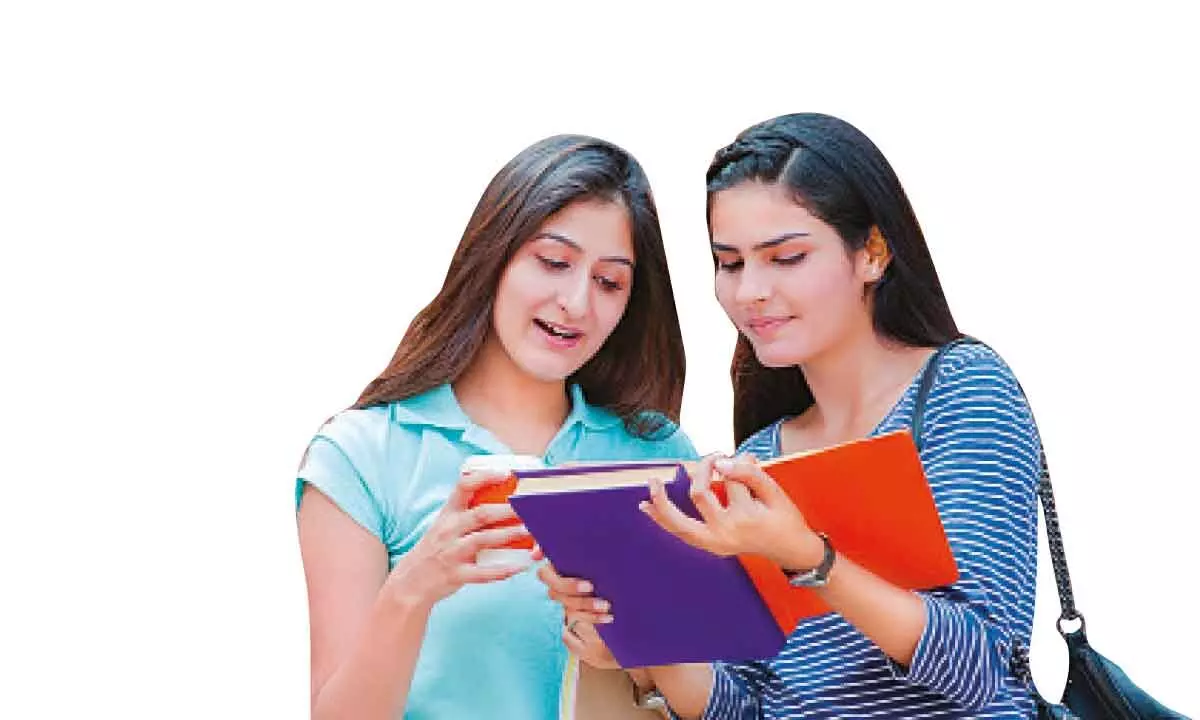Live
- 39 Transgenders Appointed as Traffic Assistants, Demo Program Held in Hyderabad
- Grand Celebration of the 18th Mahapadi Puja held at Shamshabad Ayyappa Temple
- MLA Sri Ganesh distributes cheques to beneficiaries under CMRF
- BGT: Do feel for Nathan, but totally understand why Australia dropped him, says Vaughan
- PM Modi accorded Guard of Honour at Kuwait's Bayan Palace
- Sports Minister flags off ‘Fit India Sundays on Cycle' initiative
- Brunei cracks down on activities of international drug cartel
- Peace and development in Tripura, says HM Shah after meeting Reang tribals
- Two terror associates arrested with arms, ammunition in J&K’s Sopore
- L-G Saxena visits Delhi areas, says people's plight pathetic
Just In
Indian women in higher education abroad


In recent years, there has been a remarkable surge in Indian women opting for higher education abroad, marking a transformative trend in the global...
In recent years, there has been a remarkable surge in Indian women opting for higher education abroad, marking a transformative trend in the global academic landscape. It is imperative to look into the factors propelling this surge, shedding light on the motivations, preferred destinations, academic choices, and the profound impact on the careers of Indian women.
As one may be aware, recent data showcased that in FY21, applications from female students constituted 20-30% of the total aspirants, which has soared to 40-45% by FY24. Simultaneously, female aspirants’ demand for education loans has risen from 25-30% in FY21 to 35-45% in FY24. Importantly, this surge isn’t confined solely to metropolitan areas; it resonates significantly among students from smaller towns, contributing substantially to this dynamic statistical shift.
While India boasts esteemed universities and colleges, there are inherent systemic factors such as limited capacity, stringent entrance criteria, and the demand-supply gap in specialised courses. Furthermore, cultural and societal factors may influence educational choices for many women, impacting their pursuit of certain fields. This contextual understanding forms the backdrop against which the surge in Indian women opting for international education unfolds, revealing the motivations and aspirations that drive this transformative trend. The primary motivations driving Indian women to pursue higher education abroad also may include familial encouragement and the allure of international job opportunities.
UK, USA, Canada, and Australia remain the most preferred study destinations, offering young women a chance to explore diverse cultures and educational avenues beyond their borders.In addition, a closer look at the academic landscape reveals a growing interest among Indian women in fields such as Artificial Intelligence, Robotics, Marketing, Logistics, Computer Science, Art &Design, and Performing Arts. These choices reflect a pursuit of specialised knowledge and a desire to break barriers in traditionally male-dominated fields.
Global opportunities shaping aspirations for young women
Global opportunities play a pivotal role in influencing the decision of Indian women to pursue education abroad. Success stories abound, showcasing women who, armed with an international education, have excelled in areas that may not be as popular or lucrative in their home country. For instance, the field of biotechnology has seen significant advancements due to exposure gained through overseas education.Studying abroad offers Indian women the opportunity to immerse themselves in global cultures, explore international job opportunities. It also expands their worldview that nurtures innovation and resilience, contributing to the diversification of career paths.
Embarking on higher education pursuits abroad is undoubtedly an enriching journey, but it is not devoid of challenges. These hurdles, however, are not discriminatory; they traverse the paths of both men and women alike. As aspiring scholars venture beyond borders, cultural adjustments, academic structure shifts, financial management intricacies, language barriers, and bouts of homesickness become integral facets of their overseas academic experience. Evolving solutions and support systems have emerged to address these challenges, ensuring a smoother transition for aspiring scholars.
Various support systems and initiatives have emerged to facilitate their journey. Mentorship programs play a pivotal role, connecting aspiring scholars with experienced mentors who provide guidance on academic, professional, and personal fronts. Cultural integration workshops address the nuances of adapting to new environments, fostering a sense of belonging and confidence. Additionally, various financial aid opportunities, including scholarships and grants, alleviate the economic burdens associated with international education. These concerted efforts mitigate challenges and contribute to a more inclusive and supportive ecosystem for Indian women navigating the complexities of studying abroad. In light of the global push for women’s empowerment, it is anticipated that the trend of Indian women pursuing higher education abroad will continue to grow. A noteworthy prediction, in my view,is that I won’t be surprised to see more women than men in the global C-suite arena in the next decade.
(The author is Co-Founder, Gresham Global)

© 2024 Hyderabad Media House Limited/The Hans India. All rights reserved. Powered by hocalwire.com






